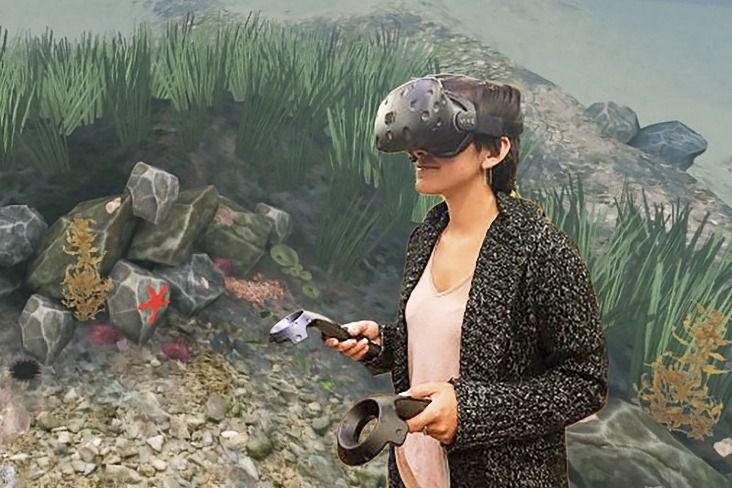How to save the planet from your couch
By Thomas Gaulkin | December 3, 2018
 A researcher tries the Stanford Ocean Acidification Experience, a virtual reality science education tool. Photo: Stanford Virtual Human Interaction Lab
A researcher tries the Stanford Ocean Acidification Experience, a virtual reality science education tool. Photo: Stanford Virtual Human Interaction Lab
It’s been a big month for people who worry about climate change. The National Climate Assessment issued dire warnings about the future impacts of global warming in the United States. The G20 meeting in Buenos Aires was just the latest exercise in Trump’s climate denialism. And the COP24 conference in Poland began today with a plea for action as Sir David Attenborough warned “the collapse of our civilizations and the extinction of much of the natural world is on the horizon.”
If that all leaves you wanting to escape reality altogether, a new set of studies suggests you might be able to do that while still getting a better view of how bad things really are. According to researchers at Stanford University and the University of Oregon, a virtual reality simulation of ocean acidification—one of the potentially devastating ecosystem impacts of climate change—gave high school students a long-lasting comprehension of the issue.
“In the immersive VR session, a synchronized narration told participants that their body had become a coral,” the authors write in Frontiers in Psychology. As simulated ocean water pH levels decrease, the narrator explains the problem: “If ocean acidification continues, ecosystems like your rocky reef, a world that was once full of biological diversity, will become a world of weeds.” Even when the students explored the virtual reef as regular old human scuba divers, they still experienced an increase in “environmental concern.”
That’s the good news.
The bad news: According to a study Bryan Schatz wrote about in Mother Jones last week, global electricity consumption from playing video games is 75 billion kilowatt hours a year, “equivalent to the output of 25 electric power plants”—or one LED light bulb kept on three hours a day “for every man, woman, and child on the planet.”
Digital activities like Bitcoin mining have been increasingly criticized for their high energy use. As detailed previously by the Bulletin, if the cloud were a country, it would rank sixth overall in national energy consumption.
But the specific impact of games has not been studied as carefully. So Evan Mills, a senior scientist at the Lawrence Berkeley National Laboratory (LBNL) and a member of the Intergovernmental Panel on Climate Change, decided to lead a team of researchers in a specially designed “gaming lab” that monitored the energy use of games like Call of Duty: Black Ops, Skyrim, and FIFA17 over a period of two years.
That sounds like fun, but what they found wasn’t at all. “American gamers emit about 12 million tons of carbon dioxide annually—the equivalent of about 2.3 million passenger cars,” Schatz reports. “Games are rated for things like sex and violence, Mills points out, but games and gear are ‘silent on their carbon footprint.’”
Schatz notes that the Lawrence Berkeley study found gamers’ energy consumption could drop by nearly a fourth over the next five years by making changes to equipment and playing habits. If the environmental virtual reality and gaming movement really takes off, maybe one day you’ll see a “carbon neutral” option next to your escape key.
Publication Name: Mother Jones
To read what we're reading, click here
Together, we make the world safer.
The Bulletin elevates expert voices above the noise. But as an independent nonprofit organization, our operations depend on the support of readers like you. Help us continue to deliver quality journalism that holds leaders accountable. Your support of our work at any level is important. In return, we promise our coverage will be understandable, influential, vigilant, solution-oriented, and fair-minded. Together we can make a difference.















